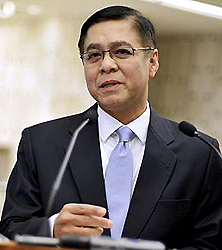Achara Ashayagachat, March 16, 2012
Thailand has fared well in reporting its further
pledges and reservations to the Human Rights Council in Geneva on
Thursday, promising to invite three more special rapporteurs to the
country in the next three years.
Mr Sihasak spoke for about 12 minutes, followed by 11 Council members for two minutes each, then other interested parties including the Association for the Prevention of Torture, Human Rights Watch, Asian Forum for Human Rights and Development, Asian Legal Resource Center, Instituto Internazionale Maria Ausiliatrice, Action Canada for Population and Development, International Commission of Jurists, International Federation for Human Rights, and Amnesty International.
 Sihasak Phuangketkeow (Photo AFP)
Sihasak Phuangketkeow (Photo AFP)Speakers at the Thursday session included Cuba, Algeria, Indonesia, the troika which were tasked to initially "read" the Thai report. All Asean countries except the Philippines shared their views. China also had a chance to speak but the limited time did not allow for comment by Western countries which have posed strong recommendations that Thailand did not "accept' during the October session or this meeting.
The Philippines' prepared statement commended Thailand’s improvement of the human rights of migrant workers and the course of the Asean human rights environment. However, in the concluding paragraph they made a diplomatic gaffe with a reference to the "Democratic Republic of Thailand".
The 75-minute live broadcast, which began at 4.45pm Bangkok time, was widely monitored by domestic human rights activists.
Thailand accepted 100 of 172 recommendations and on Thursday pledged to further accept another 34 recommendations, mostly about enhancement of the human rights landscape for all, but rejected 40 recommendations which questioned the administration of the Thai justice system and political and social rights as well as freedom of expression.
The "No" responses included: recommendations to abolish provisions in the Internal Security Act and section 17 of the emergency decree which grant immunity for criminal and civil prosecution to state officials (proposed by Canada and Switzerland); to review the Criminal Code's section 112 (the lese majeste law) and Computer Crime Act to ensure freedom of expression (UK, Brazil, Norway, France, Spain, Slovenia, Indonesia, Switzerland and Canada); and to abolish the death penalty (Brazil, Turkey, Slovenia, Argentina and France).
Otgher rejections would also go for recommendations for Thailand to ratify the Rome Statute of the International Criminal Court and the Convention on the Prevention and Punishment of the Crime of Genocide (Austria and Hungary), to accede to the International Convention on the Protection of the Rights of All Migrant Workers and Members of Their Families (Turkey, Philippines and Algeria) and to accede to the U N Convention on the Status of Refugees and the 1967 Protocol as well as to the 1954 Convention on the Status of Stateless Persons (France and Switzerland).
Points from oral statements by the NGOs included lauding Thailand for its pledge to sign the International Convention for the Protection of all Persons from Enforced Disappearances (CED), but urging a timeline for its prompt ratification without reservations.
They also called for a transparent mechanism to periodically review the government's position on the ratification of the Convention relating to the Status of Refugees and its Protocol as well as the Convention relating to the Status of Stateless Persons with involvement of civil society.
The NGOs told the Council that though the Thai government accepted the recommendations posed by Vietnam, Laos and Malaysia to prioritise national reconciliation, and despite the pledges of the Yingluck administration to reform the mandate of the Truth and Reconciliation Commission of Thailand to ensure its focus on establishing the facts of the alleged human rights violations committed during the April to May 2010 conflict, the truth-seeking has been entirely overlooked in the interim reports, public hearings and other events. Furthermore, there has been a significant delay in the process for prosecuting the alleged perpetrators.
The NGOs also share the view of several states including the United Kingdom that it should be "possible to debate the role of the monarchy and constitution without fear of prosecution".
"We are concerned that lèse-majesté cases continue to proliferate due to the lack of clarity in the scope and application of the 2007 Computer Crimes Act and section 112 of the Criminal Procedures Code.
"In addition, the undue restrictions to the right to bail of persons accused under lese majeste laws are troubling as in the case of labour and media activist Somyot Pruksakasemsuk," the NGOs said.
The oral statements were also concerned about the death penalty and the prolonged use of special security laws in the southern border provinces, which contribute to the culture of impunity.




No comments:
Post a Comment